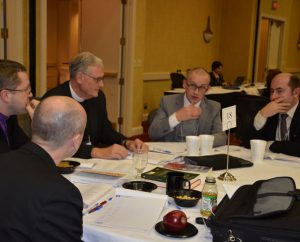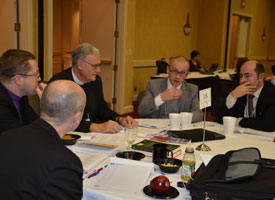By Adriane Heins
“It’s not medieval Europe,” says the Rev. Larry Vogel, associate executive director of the LCMS Commission on Theology and Church Relations (CTCR).
Vogel is talking about the world in which Lutheranism exists today and, more poignantly, why the second International Conference on Confessional Leadership in the 21st Century will focus on a timely topic: “Celebrating the Reformation Rightly: Remembrance, Repentance, Rejoicing.”
More than 100 Lutheran leaders from Africa, Asia, Latin America, Europe and the United States are expected to gather for the conference May 5-8, 2015, in that former “medieval Europe” where the Reformation began — in Wittenberg, Germany — continuing the conversation that began at the first conference, held in 2012 at Peachtree City, Ga.

Keynote speakers on the conference agenda include LCMS President Rev. Dr. Matthew C. Harrison; the Rev. Dr. Robert Kolb, professor emeritus of Systematic Theology at Concordia Seminary, St. Louis; and the Rev. Dr. James Nestingen, former professor of Church History at Luther Seminary, St. Paul, Minn. A number of other leaders from world Lutheranism also are scheduled to speak.
The conference, “which is especially exciting and significant because it’s moving toward 2017 and the anniversary of the Reformation,” is a call to Lutherans that “we’re not ashamed to remember who we are and where we come from as confessional Lutherans,” says the Rev. Dr. Joel Lehenbauer, executive director of the CTCR. “We remember and rejoice in the historical roots of what the Reformation was all about.”
Lehenbauer says that doing so requires Lutherans to take a hard look at the past 500 years. “In remembering, we also find an emphasis on and a need for repentance,” he notes. “Repentance stands at the heart of the Reformation. That’s the whole Christian life.”
Beyond talking remembrance, repentance and rejoicing, conference attendees can also expect to “spend time at this conference talking about how we can help each other when we go home, getting ready for our own celebrations of the Reformation,” explains Lehenbauer. “We hope to leave on a note of rejoicing, trusting in God for a lot of good things to come that we may not even see or envision.”
“Holding the international conference in Wittenberg, the birthplace of the Reformation, helps make the theme of remembrance, repentance and thanksgiving come alive,” says the Rev. Dr. Albert B. Collver III, director of Church Relations for the LCMS. “Many of the conference participants, particularly those from the global South, have not had the opportunity to see Luther’s homeland. The crescendo toward the 500th anniversary builds for confessional Lutherans at this conference.”
Discussing Lutheranism’s 500-year-old roots — and how confessional Lutheran church bodies continue to draw on those — is central to the conference, Vogel agrees, because, “for some of the newer Lutheran churches — in Africa, for instance — there’s less of a direct connection to what the Reformation is. This conference will be informational, but it will identify the reasons that the Reformation remains relevant today.”
Since the Reformation, “many things have changed,” Vogel explains. “But the key articulations of the Reformation — Scripture’s authority, the centrality of the Gospel, Christ and His work — they continue to be at the heart of the church today.”
An added bonus? If the first conference is an indicator, the second will have a distinguished effect: “Every time I meet someone who attended the Atlanta conference, they say how helpful it was,” Lehenbauer says. The conference “connected them with other Lutheran ideas and churches.”
“We hope the interconnection between the LCMS and confessional Lutheran churches worldwide will increase due to this conference,” agrees Vogel.
While the second conference, as with the first, is an invitation-only event, interested LCMS pastors and laypeople may receive daily news briefs and updates during the conference via LCMS social media and the Witness, Mercy, Life Together blog.
The CTCR also will post conference information on its website at lcms.org/ctcr.
Adriane Heins is executive editor of The Lutheran Witness.
Posted July 17, 2014 / Updated July 18, 2014 / Updated July 21, 2014
